

Opening and closing lines. Opening lines: Why do we need an opening line in a business letter or formal email?
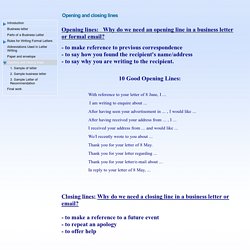
- to make reference to previous correspondence - to say how you found the recipient's name/address - to say why you are writing to the recipient. 10 Good Opening Lines: With reference to your letter of 8 June, I ... I am writing to enquire about ... After having seen your advertisement in ... , I would like ... After having received your address from ... , I ... I received your address from ... and would like ... Business Letter - Salutation. If you know the person's name: Dear Ms/Miss/Mrs/Mr/Dr + surname Dear Mr Miller You can also write the person's full name.
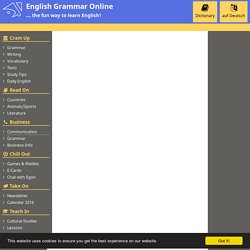
In this case, leave out the title (Mr/Mrs). This way of writing the salutation is very handy if you don't know the gender of the person. Dear Chris Miller If you don't know the person's name: There are several possibilities to address people that you don't know by name: Business partners often call each other by their first names. Dear Sue Punctuation In British English, don't use any punctuation mark or use a comma. Dear Mr Miller or Dear Mr Miller, In American English, use a colon: Dear Mr. For examples see → Subject. Ms, Miss or Mrs? Mrs – to address a married woman Miss – to address an unmarried woman (rarely used now) Ms – to address a woman whose marital status you don't know; also used to address an unmarried woman. Business Letter Writing Basics. By Kenneth Beare Updated December 20, 2014.
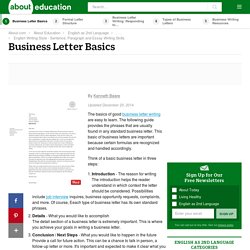
The basics of good business letter writing are easy to learn. The following guide provides the phrases that are usually found in any standard business letter. This basic of business letters are important because certain formulas are recognized and handled accordingly. Think of a basic business letter in three steps: Introduction - The reason for writingThe introduction helps the reader understand in which context the letter should be considered. Continue reading below our video Play Video The phrases presented in this guide provide a frame and introduction to the content of business letters. The Start The start of any business letter begins by addressing the recipient of the letter.
Dear Personnel Director, Dear Sir or Madam: (use if you don't know who you are writing to) Dear Dr, Mr, Mrs, Miss or Ms Smith: (use if you know who you are writing to, and have a formal relationship with - VERY IMPORTANT use Ms for women unless asked to use Mrs or Miss) A.M., P.M., a.m., p.m.: What Is the Correct Time? Pam wrote to me to settle a debate between the younger and the older employees in her office.
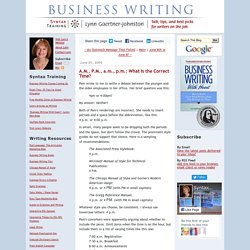
Her brief question was this: 4pm or 4:00pm? My answer: Neither! Both of Pam's renderings are incorrect. She needs to insert periods and a space before the abbreviation, like this: 4 p.m. or 4:00 p.m. In email, many people seem to be dropping both the periods and the space, but don't follow the crowd. The Associated Press Stylebook: 4 p.m.Microsoft Manual of Style for Technical Publications: 4 P.M.The Chicago Manual of Style and Garner's Modern American Usage: 4 p.m. or 4 PM (with PM in small capitals) The Gregg Reference Manual: 4 p.m. or 4 P.M.
Whatever style you choose, be consistent. Pam's coworkers were apparently arguing about whether to include the zeros. Thank You in Advance. In email, letters, and memos that include a request, writers often end with one of these statements: "Thank you in advance for your attention to this matter.
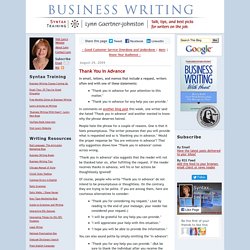
" "Thank you in advance for any help you can provide. " In comments on another blog post this week, one writer said she hated "Thank you in advance" and another wanted to know why the phrase deserves hatred. People hate the phrase for a couple of reasons. One is that it feels presumptuous. "Thank you in advance" also suggests that the reader will not be thanked later on, after fulfilling the request.
Of course, people who write "Thank you in advance" do not intend to be presumptuous or thoughtless. "Thank you for considering my request. " You can also sound polite by simply omitting the "in advance": Bec p writing part 1 prep. Pre-Intermediate. Unit 06: Giving bad news and saying sorry. Apology for Overshipment.